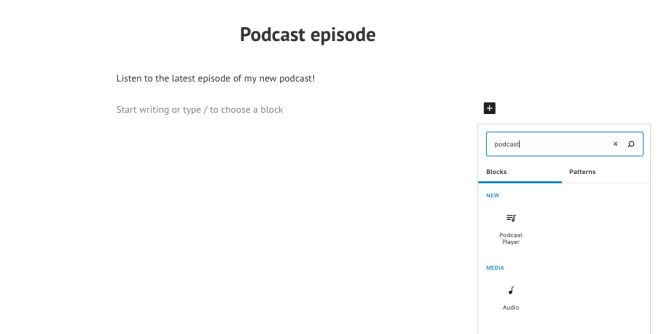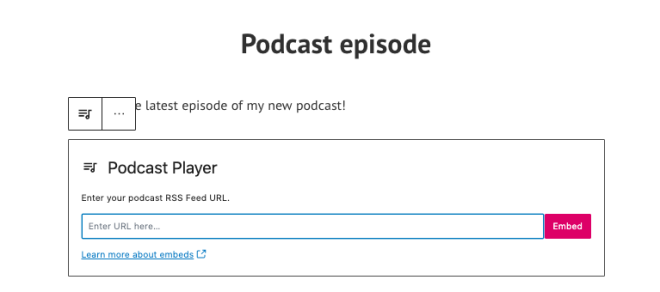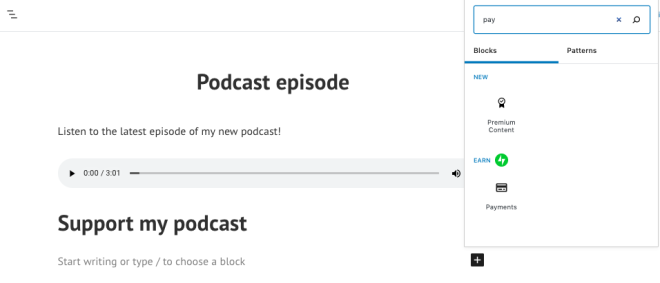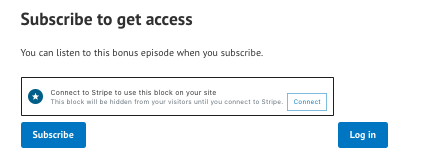
Cesar Abeid is a Happiness Team Lead with Automattic, as well as a podcaster, thought leader, and author on project management, who has presented on the topic of podcasting with WordPress. In this blog post, Cesar writes about his podcasting experiences, and those of his colleague, Richard Midson, pulling together everything they have learned about podcasting.
If there was ever a time to take the plunge with podcasting, it’s now. The number of podcast episodes has increased by 62% in two years, from 18.5 million in 2018 to 30 million in 2020, and three-quarters of the US population is now familiar with podcasting.
After more than a decade of growth at a quieter and steadier rate, this recent podcasting boom has turned podcasters into regular guests in our lives through our speakers and headphones.
The popularity of podcasting, however, poses challenges for newcomers who want to stand out and build an audience. Breaking through the noise is made even more difficult because search engines haven’t figured out how to index podcasts yet. Google hasn’t quite caught up with the great numbers of podcasters taking to the digital airwaves, and while some podcast episodes are now shown in search results, search capabilities are still quite limited.
Building a website is therefore a key way to get your podcast noticed. As well as being a great addition to using the likes of Spotify, iTunes and Google Play, it also pushes traffic to your podcast independently of streaming platforms.
In a different approach to blogging, which often prioritizes high traffic and clicks, the aim for podcasting is to get downloads and build a deeper connection with your listeners. So to keep them tuning in every week, you’ll also need to provide high-quality episodes.
In podcasting you can discuss anything you like, but this freedom, and the pressure to seem “relevant”, sometimes leads to podcasts feeling inauthentic – a common problem particularly for new podcasters.
In this blog post, I’ll cover everything I’ve learned, from starting out in the world of podcasting and building traction with your target audience, to how to level up with monetization, and conclude with the golden rules of podcasting.
After learning how to produce your podcast, we’ll go into more depth about how WordPress.com supports your podcast by handling all the technical features that help you get found on Google, providing a platform to increase your reach and visibility.
Journeys into podcasting
I’ve been podcasting for a decade and I created my first podcast to interview people in the construction industry for a small family business. My podcasting style has evolved over the years and I’ve developed a more personal feel than when I started out. I now document my journey developing project management skills on the Project Management for the Masses podcast, and I have also published a book on the subject.
For this blog post, I’ve also tapped into the expertise of my colleague and fellow podcaster, Richard Midson, who became a Happiness Engineer at Automattic after a decade working in broadcasting and radio. Richard’s experience combines audio and technology, and he started podcasting with an aviation show that garnered a big following but didn’t have traction with sponsors. He launched Can I Make a Hit Podcast? as an experiment to see what was needed for a successful show.

One of the most enticing things about podcasting is that they’re for everyone; there are no rules for who should create or enjoy podcasts, and by removing the technical obstacles, WordPress.com opens up this opportunity for everyone.
If you already have a WordPress.com site, you can set up podcasts without any coding or technical knowledge by adding a podcast category for your posts, hosting your audio files in your media library and adding your episodes to posts using audio blocks, which we’ll explore in detail later.
Hosting your podcasts on WordPress.com instead of exclusively using streaming platforms benefits you in terms of search engine optimization (SEO), meaning you can reach more potential listeners who will find you in Google search results.
A website moves you closer to reaching your goals by giving you a space to encourage listeners to subscribe, download episodes, or take another action on your site – such as buying podcast merch!
All the while, podcasting provides value on a personal level — not necessarily with a product or a tutorial, but with companionship. If you are the name and face of your brand, creating a podcast site with WordPress.com brings your target audience into your world and helps them get to know you, creating a lasting connection.
Getting started with podcasting
Choosing your niche and your audience
Podcasts, like blogs, benefit from having a niche — one topic you focus on. You’re ideally after a niche at the intersection of your passion and expertise. If there also happen to be existing online communities in that niche, all the better! This can help with sharing your podcast. If not, though, don’t worry: you can build that community, and a podcast website is a great way of doing that.
Think about this when you are choosing a name for your podcast. I named my first podcast Construction Industry Podcast. It sounds obvious, but choosing a descriptive name is the best way of finding people using the search terms most related to your content.
Which people are going to be looking for your content? Although you don’t get to see your listeners, visualizing your audience is vital for improving your podcasting skills. To start, it’s useful to imagine an avatar — in other words, an identity for your listener with a name, personality traits, and information about their demographics and interests. This way, you’ll develop a clear idea of whom you are creating content for, allowing you to speak directly to them when you record your podcast. It will help you decide on the content you need to work on, which guests to invite, and how to promote your show.
When you have a better idea of your target audience, you can interact with them on social media and really get to know them. Connecting with the community you want to serve enables you to identify their pain points, dig deeper into how they work, and understand what fascinates them. You should always be testing this against the avatar you’ve created and revising your goals accordingly. Then you can better consider commercial opportunities like sponsorships, depending on how they fit this audience profile.
Not only will this be useful research for finding relevant topics for your podcast, but it also provides opportunities to position yourself as an expert and a leader. You can even record episodes directly in response to people’s questions. If you find a relevant question that’s been posted on social media, you can reply saying something along the lines of: “That’s a great question, I actually created a podcast on it. Find it here.” You simultaneously connect with and engage your target audience.
Earlier in Richard’s career, as a reporter for a London-based talk radio station, he was doing undercover and documentary work, plus the drive-time news program. Then he set up a YouTube channel about private aviation. On the face of it, it seemed like a success – it got 1.6 million views, after all – but it cost a lot of money to put together, with little return. The big mistake was that the target audience was the wrong market for advertisers in the aviation industry. In hindsight, the best approach would have been to look at the target market that advertisers wanted to reach.
When choosing your niche, creative thinking exercises can help. Write down a series of words that could relate to your podcast’s niche, considering your areas of expertise and what you feel you can speak passionately about. Go back to each word and elaborate on it to make your niche more specific, or to help it stand out from the crowd. Research other podcasts on the same topic area and try to find an angle that is unique.
To test whether you could easily generate content for your podcast, create a mind map of 26 topics for roughly six months’ worth of episodes. If you struggle, it indicates that you’re likely to find producing podcasts on this topic challenging. This process helps you evaluate how realistic your idea is so you can narrow down your niche to a level you’re comfortable with, giving you a good starting point for developing your podcast.
Consistency is the main challenge
The number one challenge when setting up a podcast is consistency, and by the time you get to your seventh recording, it’s hard. Sometimes podcasters will podfade and it just fizzles out. This isn’t even necessarily because the podcaster doesn’t have the time or motivation – sometimes they just stop publishing. As we’ve explored above, finding the right niche can help you avoid this.
Choosing the right niche helps you maintain your podcast’s consistency, keeping you feeling engaged and invested in your podcast. It provides clear expectations about the types of topics you’ll cover, so your audience knows what to expect and you can plan your content to meet those expectations. You’re looking for a subject that you feel passionately about and that’s easy for you to discuss, which will still interest you in the long-run.
Richard explored why podcasters give up in Can I Make a Hit Podcast? and found that committing to scheduling in podcasting time can be useful for setting realistic goals and boundaries. At the same time, it’s equally important to not overdo it as it is to get motivated in the first place, as avoiding burnout is key. You make things simpler for yourself by podcasting within your area of expertise because you already have the background insights and can spend less time researching.
If you’ve already got an established website, it can be useful to tap into your best-performing topics and set yourself the goal of converting a fraction of your existing blog posts into audio. You can repurpose content you’ve already created to launch yourself into a new medium that your target audience will love.
Here’s Gary Vaynerchuk’s advice for content creation: “Document, don’t create.” Rather than trying to make the perfect episode and find the perfect story every time, think practically and document what you’re doing each day. It’s a lot easier to write a diary than a fictional story, and it will keep your podcast focused on the issues that matter most to you and your listeners.
To co-host, or not to co-host
Bringing a friend on board as a co-host could be good for accountability at the start, but setting up a podcast with someone else brings its own challenges. Although everyone’s situation is different, we typically wouldn’t recommend co-hosting unless you’re prepared to establish from the outset how “ownership” of the podcast will be shared.
Your interests may evolve over time and not necessarily in the same direction as your co-host. If you decide to part ways, what do you do with the podcast? If you choose to podcast with a co-host, be completely transparent from the start, making sure you’ve agreed who owns and would “inherit” the podcast.
If you create your podcast website on WordPress.com you’ll be able to share access with a co-host. This will let you both post new episodes, show notes, and whatever other resources you need, such as running a merch store to help monetize your podcast. The same caveats apply, though: make sure you’re clear with your co-host what happens if someone steps back.
Skills of a hit podcaster
Podcasting is something anyone can do, but there’s a set of skills and choices that will set you up for success.
Having the ability to tell stories is important. Personal anecdotes will naturally add value for listeners, helping your podcast gain traction. When you hear a story that resonates with you, or one that builds tension, your body releases feel-good hormones. Rather than focusing only on facts, try to turn each podcast episode into a story and bring listeners on the journey with you.
Podcasts that stand out feature stories we’ve not heard before. Find your angle and avoid being too similar to other podcasts.
If you’re going to invite guests onto your podcast, bring on people who are going to engage an audience and bring a new perspective, and try to avoid using guests who’ve appeared on competing podcasts in your niche. Podcasting is an important platform because it allows people to finally be heard on their own terms; the greatest stories are often the ones that were previously hidden.
Podcasting gear you need
For podcasters hosting interviews or recording with a co-host, you’ll need some decent hardware. You can expect to spend about $100 on a good microphone like the ATR2100x, which is a USB and an XLR microphone.
Creating your podcast will be most straightforward if you can record your audio straight onto a computer or laptop, although it’s also possible to record audio using an app on your phone or another recording device and upload it to your computer to be edited later.
If you are further along in your career as a podcaster, you might decide to get some more equipment like a mixer board to connect to. These are usually not too expensive and help with recording two or more microphones directly into your computer. If you started out with a microphone such as the one mentioned above, you’ll still be able to use it with a mixing board, as it’s both USB and XLR.
There’s some great audio software available too:
· Audacity is a very powerful open-source tool that you can use for free
· Adobe Audition is a digital audio workstation and a great paid alternative
It’s also a good idea to use transcription software to automatically transcribe episodes. This is helpful for accessibility because it means people who are deaf or hard of hearing can still enjoy your podcast.
How a WordPress.com website supports your podcast
You can create a permanent online home for your podcast with a website. It’s a place where existing listeners can find out more about you and take actions like subscribing, downloading episodes, or making purchases directly from your site.
Your website is also a vehicle for growing your audience. It solves a significant SEO challenge experienced by podcasters without websites by showing your podcast in search results to help you attract new listeners.
Setting up
Adding your podcast to your website is straightforward with WordPress.com, with built-in tools and a helpful support guide for podcasting.
Set up your podcast in WordPress.com by navigating through Manage > Settings > Writing > Podcasting > Set up. Add ‘podcast’ as a new category and then give your podcast its identity with a title, subtitle, summary and an artwork file that you upload to your media library, plus a few more details.

Create an audio file by saving the recording of your podcast episode as an mp3.

You can upload that file straight into your WordPress media library, allowing you to add it as an audio block on your website.

By using WordPress.com as your podcast’s website platform, you won’t need to find an audio file hosting company or integrate any third-party tools. Your RSS feed will be automatically generated for you to copy and submit the URL to streaming platforms.

The episodes will be hosted within the media library of your podcasting WordPress site. Designed with a powerful infrastructure, there’s a lot of room in the media library to store these files. This also provides a fast download for listeners, and you can upload them without worrying about them getting lost.
Create a new post for your episode and set the category as podcast.

Add your content – such as the title, your show notes and anything else you want to include – then add the mp3 file to the post and hit publish.

There’s also the option to use the podcast player block to add an RSS feed to embed a podcast hosted elsewhere, or link to someone else’s podcast.

Learn more and find support for podcasting on WordPress.
How to find and grow a podcast audience
Promoting your podcast is a challenge, but every podcaster needs to learn how to be seen and found so their podcast can get heard.
Guesting on other podcasts is a great way to reach new audiences, helping you plug your podcast while providing value as a guest. People will hear you and want to listen to you more, and it works. Appearing on a comedian’s podcast immediately got Richard’s podcast Can I Make a Hit Podcast? more traction and followers.
Podcasting invites your audience into your world and so does social media, so they naturally go hand-in-hand. Social media allows you to cross-pollinate and build your audience. You can get creative and share soundbites or videos from your episodes.
You can also tap into social media communities to research what your target audience wants to know about a particular topic. It helps you gain insight so you can create podcast episodes that solve problems your audience faces.
If you’re taking podcasting seriously, a podcast website is the way to go. Websites and podcasts make a fantastic partnership because if people hear you or find you on social media and want to know more, where do they go? They search for your website.
Having a podcast website increases reach and visibility while attracting new listeners through SEO too. Transcribed content and show notes can offer a great boost for SEO by including the topics and keywords you’ve covered naturally in your audio as text on your website. Ranking higher in search results through SEO helps you grow your audience.
Search engines still don’t fully understand how to index podcasts alone, creating a major problem for so many podcasters without websites. Building a podcasting WordPress site solves this by showing search engines what your podcast is all about.
When creating your site with WordPress.com, consider your goals. Some podcast websites will have just two aims, getting visitors to:
1. listen to an episode
2. subscribe
Others will have specific aims for marketing or generating sales. Consider your call-to-action: what do you want web visitors to do on your podcast website? Be specific about how you want your website to contribute towards your goals and objectives.
Leveling up your podcast website with monetization
You can monetize your podcast with ads, affiliate marketing and sponsorships, or through direct payments on your website. We recommend constantly evaluating the suitability of advertisers, affiliates and sponsors, to make sure they sit well with you and your listeners.
Ads and sponsorships involve inserting pre-recorded clips into an episode. The difference is that usually, ads are recorded by the advertiser whereas sponsorships are recorded by you. Both generally involve a payment per episode.
Affiliate marketing relates more specifically to what your target audience wants to hear about. Let’s say you decided to record a podcast about creating your own grape jam and found a specific mason jar you wanted to recommend. You could reach out to the company selling the jars to see if they have an affiliate program, and that starts a business relationship.
It’s win-win because you like the products and are genuinely recommending them, and the company makes more sales and tracks how many came from your podcast, then gives you a percentage of the revenue. You might also add discount codes to your show notes, so the listener benefits too.
You can also monetize directly from your podcast website. For instance, some podcasters sell merchandise, set up memberships and support funds, or release exclusive paid-only content.
WordPress.com websites allow you to set up payments to your website using:
· Payments block features

The Payments block uses Stripe to collect payments. Connect your WordPress.com account to Stripe when you first use the block.
Adding the Payments block to the post releasing your latest podcast episode will allow you to collect money from listeners – for example, by using a ‘Support my podcast’ sub-heading that encourages contributions.

Using Payments and the Premium Content blocks together, you can set up monthly or annual payments to provide access to exclusive content. With this feature, you could choose to make your podcast subscription-based or release bonus episodes of your podcast for paying listeners.

When setting up premium content, WordPress.com customization tools allow you to create a different view of your post for subscribers and non-subscribers, using the block to create a logged-out view and a subscriber view.
There’s loads of support available to help you learn more about taking payments or using premium content on your WordPress.com site.
Golden rules of successful podcasting
Podcasting is easy and challenging in different ways. If you’re thinking long-term about the commercial opportunities, find your niche, discover exactly who your audience is, and connect with them deeply. Avoid our past mistakes: don’t start without a plan, or put your efforts into a non-commercial venture if you want to work with sponsors in the future.
Prioritize creating high-quality episodes with storytelling running through them, tapping into new perspectives, and bringing in guests with unique contributions to make. However, don’t let perfectionism hold you back.
Creating a podcast website helps you increase your visibility so your podcast gets found by more listeners. Expand your reach with a podcasting WordPress website so you can benefit from an easy setup with technical features built-in. This helps you solve the major SEO problems facing podcasters without websites. You should also consider guesting and using social media to get your podcast noticed.
By building up your following, you’ll have the opportunity to promote your products and services, or monetize your podcast through ads, affiliate marketing, sponsorships or direct payments on your site.
Remember to always aim to podcast with consistency, authenticity, and passion, and with a podcast website from WordPress.com, you’ll put yourself in a fantastic position for success!

